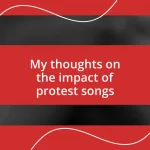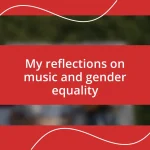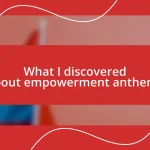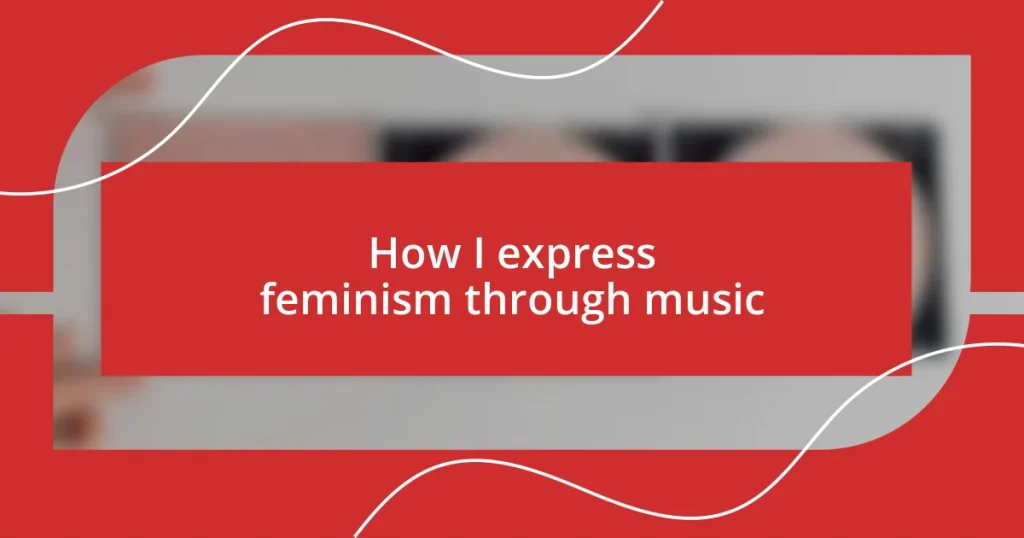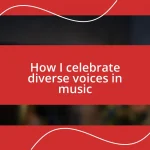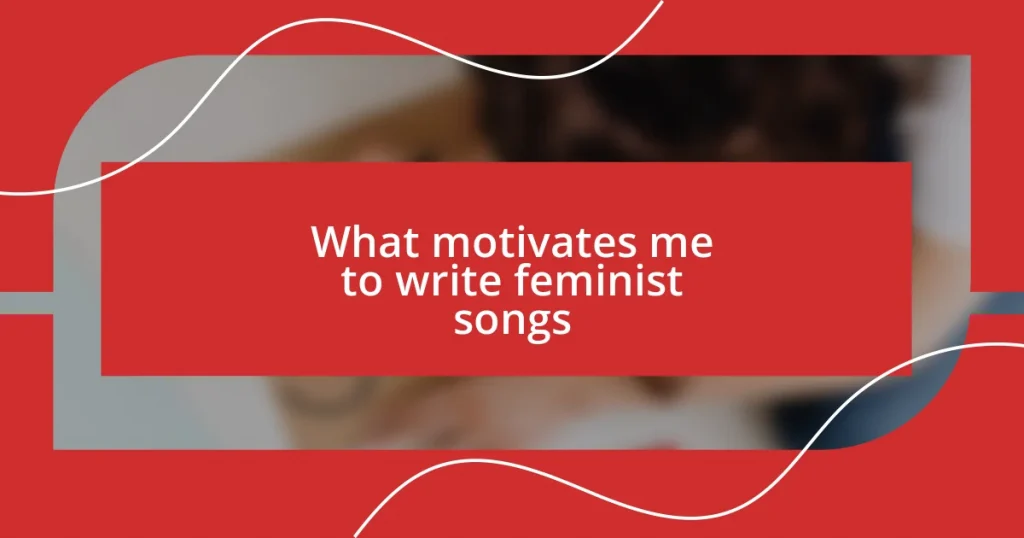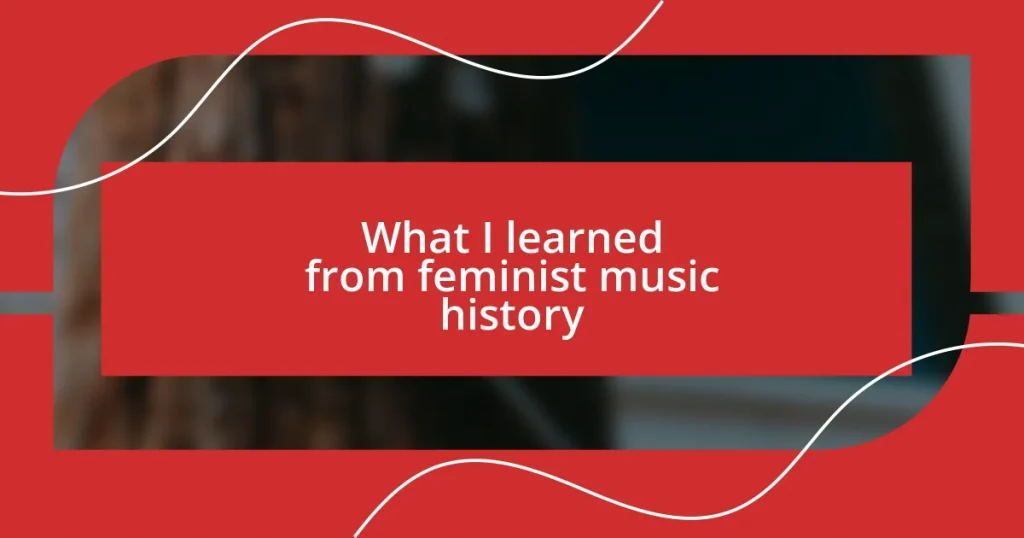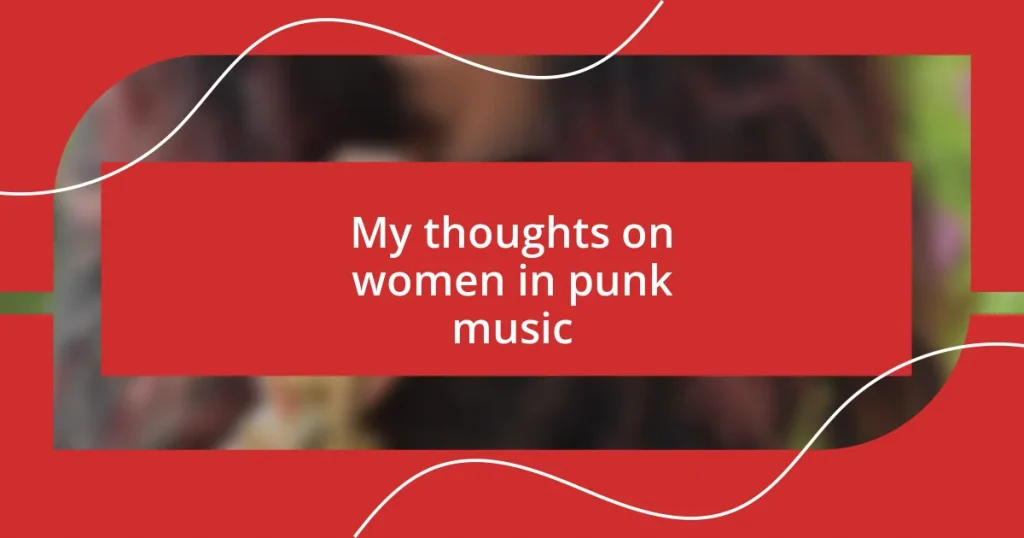Key takeaways:
- Feminist music empowers artists to express ideals of equality, challenge societal norms, and inspire discussions around identity and strength.
- Creating empowering playlists fosters shared experiences and uplifts women’s voices, emphasizing themes like individuality, body positivity, and confidence.
- Collaborating with other musicians enhances creativity and encourages emotional connection, resulting in songs that blend diverse perspectives and experiences.
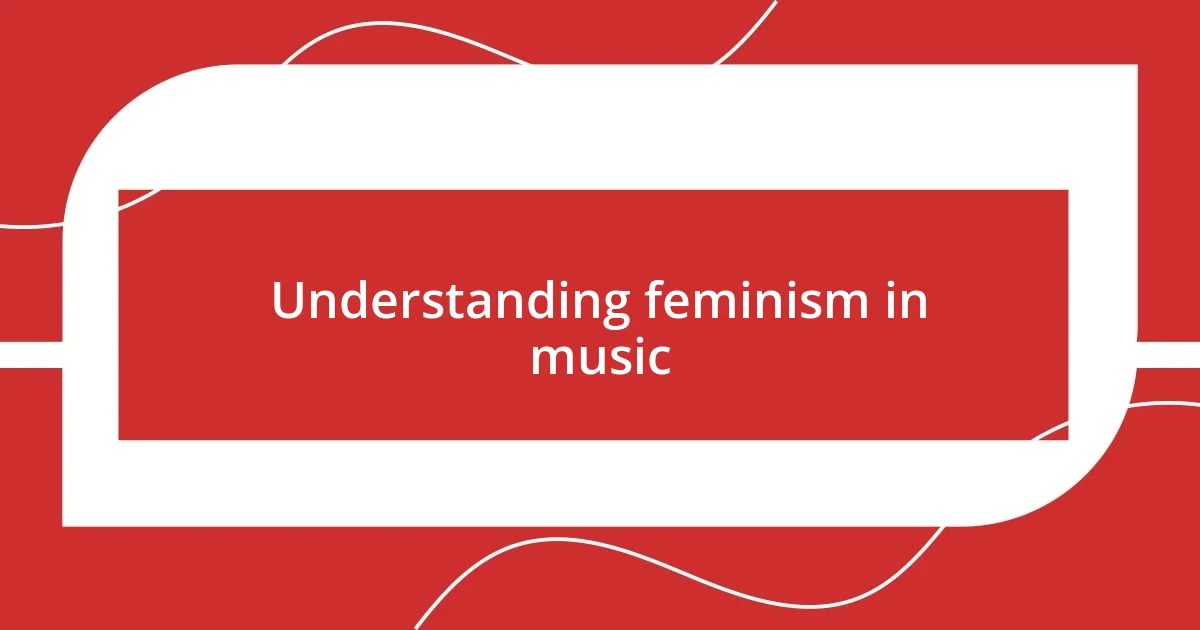
Understanding feminism in music
Feminism in music is a powerful lens through which artists express ideals of equality and empowerment. I remember the first time I listened to a song by Alanis Morissette; her raw honesty struck me. It made me question, “Why don’t we hear more women speaking their truths like this?” Music has the unique ability to articulate the struggles and triumphs of women, resonating deeply with listeners.
Through the decades, we’ve seen artists use their platforms to challenge societal norms. Take Beyoncé, for instance—her work embodies the intersectionality of race and gender, igniting discussions about identity and strength. I often find myself reflecting on how such songs inspire both young women and men to reconsider traditional roles. Isn’t it fascinating how a catchy hook can spark a conversation about deep-rooted issues?
The beauty of feminist expression in music lies in its diversity. From punk rock to hip-hop, artists like Lizzo and Karen O showcase varied experiences and perspectives. Honestly, every time I hear Lizzo’s anthems, I feel a surge of confidence. It’s as if she’s reminding me—our voices matter, regardless of society’s expectations. How can we not celebrate such a vibrant tapestry of stories and sounds that promote empowerment?
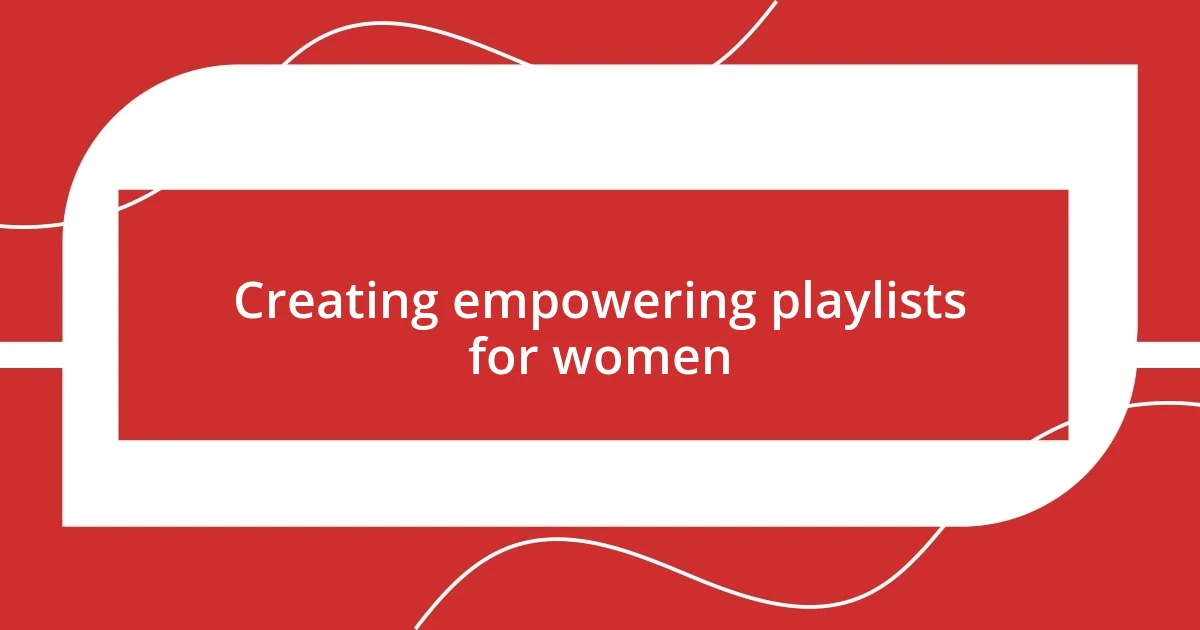
Creating empowering playlists for women
Creating playlists that empower women is a beautiful way to share messages of strength and resilience. I love curating songs that uplift and inspire. For instance, when I need a boost of confidence, I turn to artists like Janelle Monáe and her powerful lyrics that embrace individuality. There’s just something magical about hearing a song that resonates with my own journey, reminding me to embrace my inner power.
While I find that mainstream radio often overlooks female artists, creating empowering playlists allows me to elevate their voices. I often include tracks by artists who address issues like body positivity and self-love, such as Meghan Trainor’s “All About That Bass.” I’ve noticed how sharing these playlists with friends creates a shared experience; we bond over the messages of empowerment and support. Does anyone else feel that thrill when you play a song that makes you feel invincible?
Ultimately, the process of building these playlists is personal and reflective. Each song serves as a chapter in our collective narrative of womanhood. I once made a playlist for a friend’s birthday, specifically focusing on songs that encourage self-love and self-expression. Watching her light up as she listened was immensely gratifying. It’s a reminder that music can do more than entertain; it can heal, unite, and inspire.
| Artist | Theme |
|---|---|
| Janelle Monáe | Individuality |
| Meghan Trainor | Body Positivity |
| Lizzo | Confidence |
| Beyoncé | Empowerment |
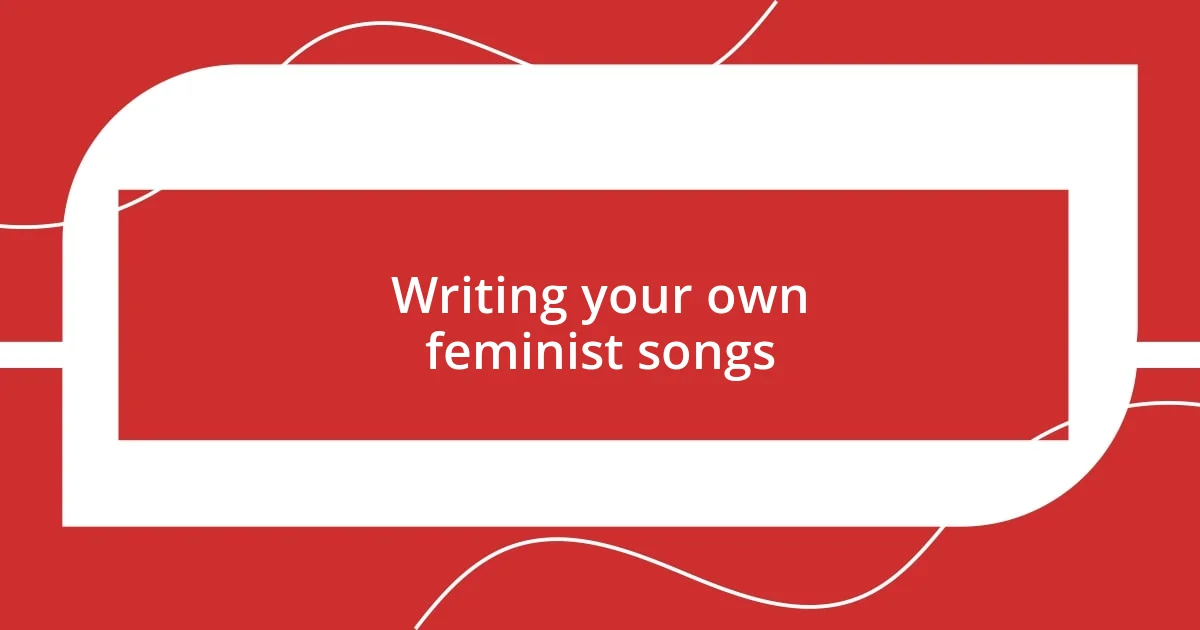
Writing your own feminist songs
Writing your own feminist songs can be a liberating journey. I still remember the first time I put pen to paper, crafting lyrics that flowed from my heart. The sense of empowerment was palpable; it was as if I was reclaiming my voice. To me, each lyric serves not just as an expression of my thoughts but also as an invitation for others to find their truth.
Here are some tips to guide you in writing your own feminist songs:
- Identify Your Message: Think about the issues that resonate with you personally, whether it’s gender equality, body positivity, or intersectionality.
- Draw from Your Experience: Use your life stories. The more authentic you are, the more relatable your song will be.
- Use Strong Imagery: Paint vivid pictures with your words to evoke emotions and connect with listeners.
- Experiment with Genres: Don’t limit yourself to one style. Mix elements from various genres to create something unique that speaks to your vision.
- Collaborate with Others: Sometimes, a fresh perspective can take your song to new heights. Work with fellow artists or friends to exchange ideas and feedback.
Each step strengthens not only your songwriting skills but also your confidence in sharing your perspective. Embracing the vulnerability that comes with writing feminist music can be tremendously rewarding. I remember feeling nervous sharing my first attempt with friends, but their enthusiastic support pushed me to keep creating and expanding my voice.
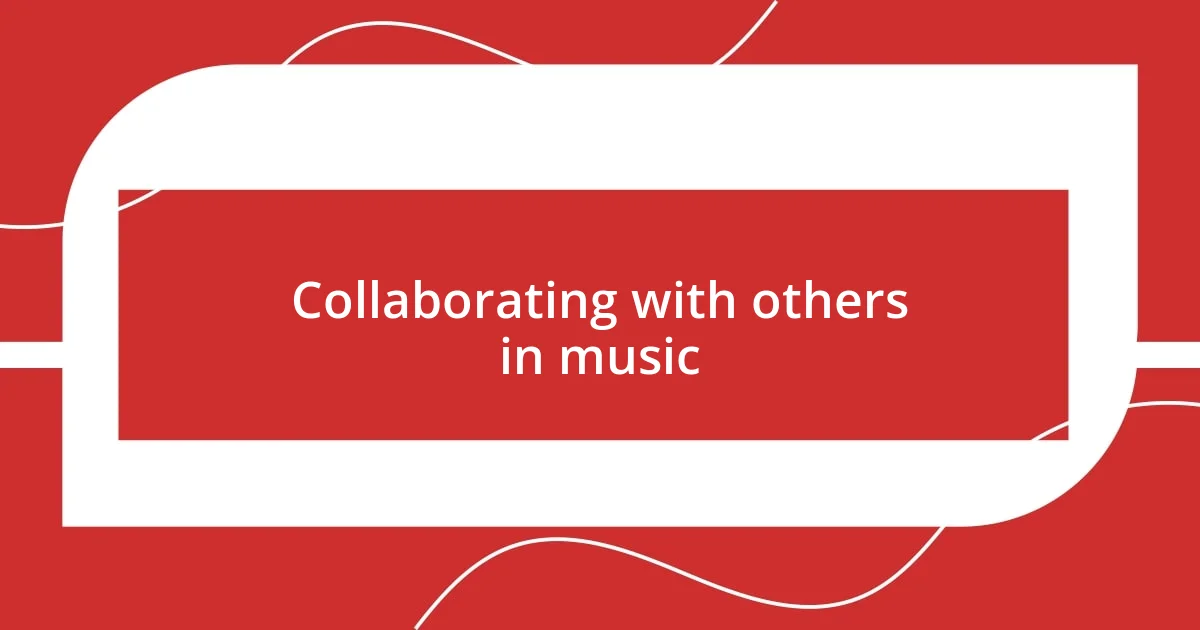
Collaborating with others in music
Collaborating with other musicians can open doors to incredible creativity. I once teamed up with a friend who plays guitar, and we spent countless hours jamming in her living room, bouncing ideas off each other. That experience taught me how collaboration can spark inspiration, leading to new musical paths that I never would have explored alone.
During one collaboration, we decided to write a song about resilience. It was exhilarating to combine our distinct styles—her acoustic sound with my more rhythmic influence. This blending not only enriched the composition but also brought forth a fusion of our individual stories, creating a piece that resonated deeply. Isn’t it fascinating how sharing our unique perspectives can lead to something not just personal, but universal?
I cherish the moments when a group of us gets together, sharing our thoughts and challenges over music. It feels like therapy; open dialogue leads to raw honesty, resulting in songs that pack an emotional punch. I remember finishing a song after a long session—exhausted but proud, I felt like we had woven pieces of our experiences into something beautiful. Those collaborative moments remind me how powerful it can be to join forces with others in music.



